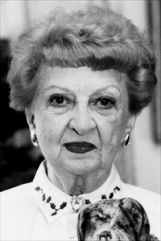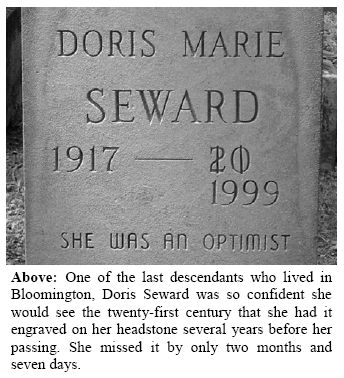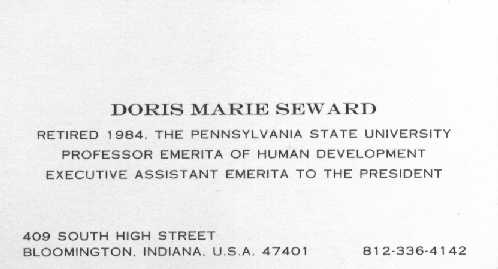Dr. Doris Seward
Doctor Doris Marie Seward was my mother's first cousin. She was
an unforgettable woman with whom I crossed paths far too seldom. During
our 1949 vacation trip, we went far out of our way to visit Doris
at her office at Purdue University. On several
occasions she put up, and put up with, my family on very short notice.
In 1973, when we visited her at College Station, PA, she babysat our three
children so that we could attend a theatre performance at Penn
State, with her tickets, by Jessica Tandy and Hume Cronyn, of
Glass Menagerie. More than a quarter century later, our
children still remember that visit.
During the last several years of her life, Doris' columns were a regular feature in the Bloomington (Indiana) Herald-Times, in which this obituary appeared:
September 25, 1999
Educator Doris Seward dead at 82
By Donita Hadley,
Herald-Times Staff Writer

Educator and writer Doris M. Seward died Thursday at Bloomington Hospital. She was 82.
Herman B Wells, chancellor of Indiana University, recalled Seward with affection.
"I will remember her fondly. She was a good friend," he said. "She certainly
had a distinguished career and was from a fine, old Bloomington family."
Born March 26, 1917, in Bloomington, Seward was the daughter of
Fred and Dorothy Florence (Hopper) Seward.
Seward's great-great-grandfather, Austin Seward, started an ironworks business in Bloomington in 1821. Her father went on to become owner of an industrial supply company in Bloomington.
A graduate of Bloomington High School, Seward was Phi Beta Kappa at IU,
graduating in 1938. She went on to a career as a teacher and leader in
student personnel administration at several colleges.
Her early years at IU included membership in Kappa Kappa Gamma and Mortar Board.
She earned master's and doctoral degrees from Syracuse University and did
graduate work at Columbia University, Union Theological Seminary and the
University of Minnesota. She served on administrative staffs at Syracuse
and Minnesota, served as assistant dean of women at Purdue University as
well as acting dean and associate professor at Purdue in the 1950s.
From 1957 to 1966, Seward was dean of women and professor of education at
the University of Kentucky, and she was the school's dean of student affairs
planning in 1967. She left Kentucky to take the post of professor of human
development and executive assistant to the president of Pennsylvania State
University in 1970. She retired in 1984.
She was a member of the U.S. delegation to the World Confederation of
Organizations of the Teaching Profession for five years in the 1960s,
inaugurating the Housemother's Training School to educate and prepare
women assuming positions of house director and house mothers for
fraternities and sororities, making numerous speaking engagements around
the world, and serving in various offices of professional organizations,
including president of the National Association of Women's Deans and Counselors.
After retiring in 1984, Seward returned to Indiana. Her donation of 20 acres
of land purchased by her father in 1928 to the Hilltop Educational Foundation
in 1991 became the Fred Seward Nature Preserve. She was active in the IU
Friends of Music and Friends of Art, and served on the Elizabeth Sage Collection board.
IU honored her with the Distinguished Alumni Service Award in 1976.
Jerry Tardy, executive director of the IU Alumni Association, said,
"Indiana University has lost one of its wisest and most loyal alumni ...
She was a giver wherever she went and always a Hoosier at heart.
"I often tell the story of how Doris had her tombstone engraved with the
year of her death beginning with a '2'; I really had hoped she would live
into the next century to see her optimism rewarded. But her legacy will
go forward well into the new millennium, in her rootedness in the past,
her enjoyment of the present, and her warm anticipation of future possibilities."
Seward was active in community projects and helped establish the
Bloomington Community Foundation, incorporated in 1990.
Seward's memberships include the American Association of University Women,
the American Personnel and Guidance Association, Trinity Episcopal Church
and the Conversation Club.
She was named a Kentucky Colonel and was the recipient of the Gertrude Rich Award.
She also wrote a column for The Herald-Times the past three years about
her experiences in life and about daily living.
Seward was preceded in death by her sister, Janet Seward Dunn.
Burial office and requiem Eucharist will be 3 p.m. Thursday at Trinity
Episcopal Church with the Rev. Linda C. Johnson officiating. Interment
will be at the Columbarium. A reception is scheduled following the services
in the Great Hall.
Day Mortuary is in charge of arrangements.
Memorial contributions may be made to Trinity Episcopal Church endowment
fund, the Bloomington Community Foundation, Bloomington Hospital, the
Fred Seward Nature Preserve in care of the IU Foundation or the Monroe
County Historical Museum.
 Doris told us several times that she planned to live into the 21st century, and that she already had her tombstone picked out. I discovered this picture in the August 2006 issue of the Monroe County Historian, published by the Monroe County Historical Society, Inc.:
Doris told us several times that she planned to live into the 21st century, and that she already had her tombstone picked out. I discovered this picture in the August 2006 issue of the Monroe County Historian, published by the Monroe County Historical Society, Inc.:
Nearly three months before Dr. Doris Seward's arrival at the University of Kentucky, a biographical sketch appeared in the local newspaper which includes extensive details of her pre-1957 career. Doris mailed the following article from the 14 May 1957 issue of the Lexington Leader to my grandmother, writing across the photo "not good picture without glasses"...
UK's New Dean Of Women Has Won Several Degrees But Lost One -- To Hungry Beagle
By Howard Gillespie
Purdue News Bureau
Tennessee Trumpet undoubtedly is one of the few dogs in the United States holding a Ph.D. degree -- the result of having completely devoured a diploma written in Latin on sheepskin. This distinguished beagle shares the home of Miss Doris M. Seward, who comes to the University of Kentucky on Aug. 1 as dean of women. Needless to say, the diploma belonged to Miss Seward.

This particular diploma was granted to Miss Seward in 1953 by Syracuse University for work in student personnel administration in higher education. She was awarded a master's degree by Syracuse in 1943 and a bachelor of arts degree in psychology by Indiana University in 1938.
Since graduating from the latter institution, Dr. Seward has won recognition as one of the nation's best qualified personnel administrators and counselors in college work. Her most recent honor came last month in her election as chairman of the University Division of the National Association of Women Deans and Counselors. This position carries with it a two-year membership on the association's executive board. Last year she was program chairman for the organization's annual meeting in Cincinnati.
Kentucky Ancestor
It was only natural that Doris Seward should attend Indiana University; for her family came to Bloomington, Ind., in 1821, where her parents, Mr. and Mrs. Fred A. Seward, both of whom are IU graduates, still reside. Her great-grandmother1 moved to Indiana from Kentucky.
Seward & Co. started out as a family enterprise working as blacksmiths and gunsmiths. Their guns were made "lock, stock and barrel." Seward & Co. still is in business, engaged in manufacturing industrial supplies,2 and is said to be the oldest manufacturing company in Indiana under continuing ownership.
"When people sometimes ask me, 'How did you get into the work you are now doing?' I have to answer: Only by the training, kindness and counsel of other people," Miss Seward says. The varied extracurricular program during her undergraduate days at Indiana, she says, offered an opportunity to develop an interest in social psychology and group techniques. Summer vacations spent as a camp counselor and director added to this experience, culminating in her first full-time job as women's director in the Huntington, Ind., YMCA, a position in a predominantly maculine organization.
In a brief time she was invited to the University of Kentucky to serve on the staff of the then-Dean of Women Sarah Gibson Blanding in the capacity of student YWCA secretary. "I count it a great privilege to have had the opportunity to work under the leadership of this outstanding individual," Miss Seward said. "When Dean Blanding left Kentucky to go to Cornell, it seemed also the time for me to take further graduate study."
Receiving a fellowship at Syracuse University, she took her master's degree, and then was asked to join the staff of the dean of women at Syracuse as religious counselor and also women's director in the Hendricks chapel on the campus.
Religious Work
A broader field of operation opened in 1945 on the staff of the Student Christian Movement of New York State. In this capacity she worked with the various agencies and churches doing religious-group work at the colleges and universities of New York. Continuing further her advanced study, she studied at Columbia University. The summer of 1947 found her, as one of two staff members designated from the national board of the YWCA, in Scandinavia to attend various student meetings, including the World Conference of Christian Youth in Oslo, Norway.
Dr. Seward went to the University of Minnesota in 1947 as associate director of the Student Activities Bureau, where her position included a wide variety of responsibilities. She remained at Minnesota until 1949, when she resumed her graduate work at Syracuse which culminated in her doctorate in 1953. During this period she also was a member of the staff of Syracuse as head resident of Brewster Cottage, a residence hall for women.
Having already achieved widespread recognition in her chosen field, Dr. Seward was called to the staff of the four-week Housemothers Training School at Purdue University in the summer of 1949 as a lecturer and counseling coordinator. She will complete her ninth year with the Purdue Housemothers Training School this summer.
With the requirements for her doctorate nearly completed, Miss Seward joined the staff of the dean of women at Purdue on a full-time basis in 1952. The following year she was made assistant dean, and during the 1955-56 academic year she served as acting dean.
Although Miss Seward's duties and responsibilities in the dean of women's office at Purdue are quite varied and extensive, they, perhaps, can best be summarized in the following paragraph:
The chief responsibility delegated Dr. Seward is in the area of planning and co-ordinating our work in individual counseling our [?] services to individual women students. This includes co-ordinating the work of all staff members in the systematic interviewing of all new women students within their first semester, conferences with all women students on academic probation, those dropped from the University for academic failure, those receiving midterm unsatisfactory work reports and those whose class attendance is unsatisfactory. It also includes the conferences initiated by individual women students who want to discuss personal problems involving vocational objective, finances, health, adjustment to the university environment, job placement, or matters of personal relationships.
Putting into operation the long-hoped-for plan of individual interviews with all new women students has been a major accomplishment in her work at Purdue. A project in which she has received widespread publicity was the incorporation of IBM machine processing for sorority rush.
In her activities outside of the dean's office, Miss Seward has served as adviser to Mortar Board honorary, president of the Faculty Women's Dinner Club, membership cochairman of the University Club, member of the cast for a University Club play and committee chairman for the American Association of University Women.
She has appeared as a speaker before numerous college groups and has conducted a weekly radio broadcast for the AAUW over WBAA, the Voice of Purdue.
600--Count 'Em--Owls
In spite of the fact that the dean's work, entailing a 24-hour a day job, Miss Seward has found time to enjoy good reading, particularly biography and philosophy, to take an interest in Oriental art and to accumulate a collection of more than 600 owls - in the form of letter openers, pitchers, plates, jars, ash trays. "They are catalogued and have become a diary of places I've been or people I have known," she said.
Miss Seward believes that in considering the education of women, attention must be given both their roles in homemaking and in income-producing activities. But equally important is woman's growth as a person and as a member of society. "The educated woman will understand her privilege and responsibility as a citizen," she states. "She will have enriched resources for her leisure time because of her education. She will have a strength in personal integration because of her educational pursuits. She will be more than a wage earner, a housewife, a mother; she will be a person, who through the advantage of education, has endeavored to develop the potential within her for the welfare of others."
She adds, "After becoming somewhat acquainted with 40 or 50 colleges in this country and abroad, I realize what a great privilege and opportunity it is to have a state university in which the people of the state pool their practical resources and their nobler vision for the education of youth and the benefit of all."
An example of Dr. Doris Seward's activities while at U. of Kentucky was found among that university's Continuing Education for Women Papers, 1964-1984:
A study conducted in 1965 by Dr. Doris Seward revealed that over 800 of the students at the University of Kentucky were women over the age of 25. To meet the special needs of these women, the University established Continuing Education for Women as a division of Undergraduate Studies. In 1967, CEW began with a staff of two--a secretary and then director, Celia Zyziewski--which was responsible for assisting the hundreds of female students over 25. Since then, CEW has been transferred to Academic Services and now serves over 2000 students.
Continuing Education for Women assists a variety of female students including women whose career goals have changed and who wish to enter new fields, whose education had for some reason been interrupted, or who are simply seeking intellectual stimulation. Through CEW, returning women can gain information related to returning women, assistance with University procedures, and support for what they are attempting to do. Among some of the activities sponsored by CEW are short-term, non-credit classes, scholarships, newsletters, and workshops. Of special note is CEW's deep involvement with Women's History Week, Project Ahead Internships, and the Women Writer's Conference.
Here is Doris' post-retirement business card:

1 Unless it refers to one of Doris' mother's ancestors, this information is off by a generation. Doris'
great-great-grandmother,
Jane (Irvin) Seward (1800-1865) came to Indiana from Kentucky.
2 By 1957, Seward & Co. was no longer manufacturing anything. It was merely
supplying industrial products to local businesses.
This page was last updated 5 Oct 2010.

 Doris told us several times that she planned to live into the 21st century, and that she already had her tombstone picked out. I discovered this picture in the August 2006 issue of the Monroe County Historian, published by the
Doris told us several times that she planned to live into the 21st century, and that she already had her tombstone picked out. I discovered this picture in the August 2006 issue of the Monroe County Historian, published by the 
